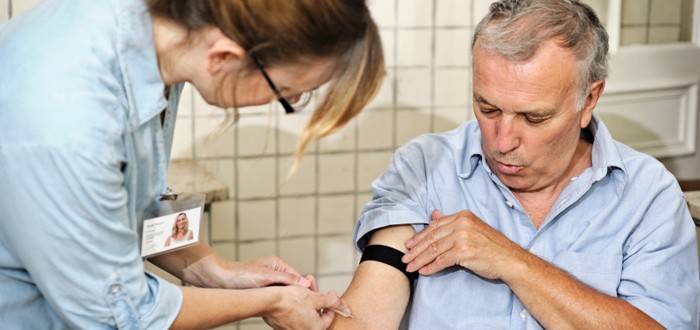You undergo a mesothelioma biopsy for three reasons. The first is to give you a mesothelioma diagnosis so you can know whether you have the cancer.
The second is to determine your mesothelioma stage so your doctors can develop an appropriate treatment plan. And the third is to tell whether the mesothelioma treatment you’ve been receiving is working.
The problem is that biopsies — especially mesothelioma biopsies — are not pleasant experiences. They are painful and hard on your body because they involve some form of surgery in order to obtain a tumor sample for examination under the microscope.
But recently some cancer doctors have started performing what are known as liquid biopsies. No surgery is involved, and some medical experts are convinced these procedures are far more valuable because of what can be learned from them.
The only thing that’s needed to perform a liquid biopsy is a specimen of your blood. A company in California is even working on a liquid biopsy method that only requires you to give a urine sample.
Liquid Biopsies for Mesothelioma and Other Cancers
The concept behind liquid biopsies is actually pretty simple.
If you have any type of cancer, a few of the tumor’s cells will inevitably break loose and enter your blood stream. Or, if not tumor cells, there will be cancer DNA strands instead.
Evidence of those cells or DNA strands will be detectable when your blood is drawn and subjected to some special testing.
Liquid biopsies are capable of detecting cancer months before it normally would be found using a conventional tissue biopsy.
An advantage of this fast, convenient detection capability is that it helps doctors quickly determine whether a treatment is doing you any good.
Great, if the treatment is working. You can continue taking it.
If it’s doing nothing, doctors can promptly put you on something different before the disease has much of an opportunity to progress.
Liquid Biopsies Becoming More Widely Used
Liquid biopsies were a rarity just two years ago. Now they are becoming almost commonplace at some cancer clinics.
Many doctors who use liquid biopsies prefer to use them when a conventional biopsy will prove too difficult to perform or just flat-out infeasible.
The older forms of liquid biopsy were designed to deal with cancer cells found in the blood. The latest versions are geared to detect cancer DNA, which allows the biopsy to yield more and better information.
Specifically, the DNA versions permit gene profiling. This lets doctors identify the mutations that are propelling your cancer and to immediately gain a sense of which therapies should work best.
The DNA versions have another advantage. They let doctors in nonurban areas provide a level of cancer care that usually is possible only in big cities.
The rural doctor need only draw a blood sample and ship it to the urban lab. When the report comes back, the doctor outside of the city can treat with a higher degree of confidence.
A number of studies looking into the efficacy of liquid biopsies have been conducted. However, experts say more are needed.
But so far, the studies appear generally supportive of the concept underlying liquid biopsies.

